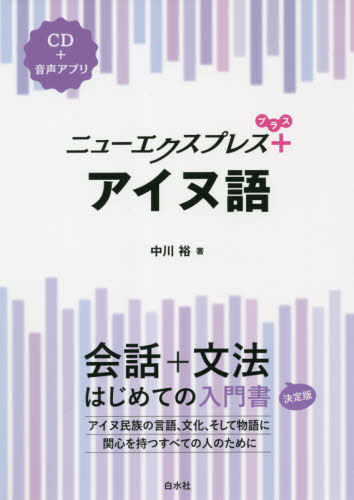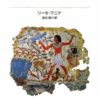アイヌ語
アイヌ人(「人間人」ということになっちゃうけど)の人口は、北海道内で約24,000人ということです。まあわかりませんが、思ったほど少なくない、というか、多くないというか、簡単なイメージを抱けるかな、といった数字です。
「日本人」の数は「日本国籍を持つ人の数」ではありません。
現在、アイヌ人で日本語を話せない人はいないそうです。アイヌ文化である狩猟採集生活をしている人はほぼいないでしょう。何しろ、日本国内では鮭を取ることすら違法なのですから、そういう生活はできないのです。
アメリカでは居住区での生活はある程度民族本来の暮らしができる環境を整えているようです。
日本には多くの民族(定義は難しい)がいます。外国から来た人(渡来人や帰化人)を除いても日本列島に倭人(和人)同様に古くから多くの民族(先住民族?)が住んでいました。北海道の先住民族というと「アイヌ」と思われていますが、他の少数民族もいました。でも、ネットで見つけることはできませんでした。文字もなく消えてしまった(同化してしまった)民族のことは残らないのです。
アイヌ語だけを使っている地域もないそうです。だから、アイヌ語を勉強したから、話ができる人(相手)が増えるということではありません。これは、英語や中国語とは全く違います。
アイヌ語には文字はありません。言葉は「音」として語り継がれています。この本にはCDがついているので、その「声」を聞くことができます。これはとてもいいことです。発音は日本語とほぼ同じです。これも助かります。外国語で難しいのは言葉の「意味」もありますが、大きいのは発音です。英語の「th」や「LとRの違い」は小さい頃から英語を話していない者には難しいと思います。中国語は、文字(漢字)を見れば意味はいくらかわかります。でも、発音はとても難しいです。その上「拼音(ピンイン)」というフリガナはヘボン式ローマ字とは異なるので、混乱します。それでも、今はYoutubeなどで音を聞けますが、話す人の出身地や個人的な特徴で違って聞こえるような気がします。ましてや100年前、1000年前にどのように発音されていたのかはわかりません。日本語だって100年前、1000年前の発音は聞くことができません。
「不」を「bu」と表記すると決めた時(場所)では「不」を「プ」と発音していたのでしょうか。
CDに録音されている声はとても若いです。何歳かはわかりませんが、こういう若い人がちゃんとアイヌ語を話せるということは嬉しいですね。
アイヌ文化
この本が面白いのは、アイヌの文化が多く載っていることです。言葉は文化だというのは当り前ですが、文化は言葉に影響され、言葉は文化によって意味づけられます。「カムイ(kamuy)」という言葉は聞いた言葉あると思います。「神」と訳されることが多いですが、「クマやキツネ」も「家や舟」もみんなカムイです。でも「汎神論」とはちょっと違う気がします。
「カムイとはアイヌ(人間)とともに、意思を持ってこの世で何らかの役目を果たしていると考えられるすべての存在を指しており、アイヌとカムイがお互いに利益を与え合うことによって、この世がうまく動き、人間も幸福になれるのだと考えられてきました。」(P.27)
一つの世界観ですね。同じように英語の「God」やドイツ語の「Geist」を知るだけでも、西洋の世界観がわかるでしょう。そしてそれによって、わたしたち日本語を話す人がどういう世界観をもっているのか、当り前(自明)だと思っている(あるいは気にもとめない)ことが、けっして「当り前」じゃないんだということがわかるはずです。
そして、「東京人と大阪人」「男と女」あるいは「わたしとあなた」にも言えるかもしれない、と思い始めるかもしれません。時代、場所、個人ごとに世界観は異なります。顔や手足が違うようにです。私の当り前はあなたのあたり前ではないのです。「平等」とか「人類愛」とか「差別撤廃」とかという言葉が「空言」「きれいごと」「理想」に聞こえるのは、この「違う」ということを前提に話をしないからです。「同じ人間でしょ」と言うのは、なにも言っていないのと同じです。老人でも子供でもない人が、「老人も子供も同じ人間だ」と本心から言えるのは珍しいのではないでしょうか。もしそうなら、なぜ子供には選挙権がないのですか。答えは「そんなの当たり前じゃん。赤ちゃんは投票できないでしょ」ですか。それじゃあ、自分で投票できない人は人間じゃないということでしょうか。「意思表示できないじゃん」、では意思表示できない人は人間じゃないですか。
そんな健常者の大人だけのタテマエの「平等」や「民主主義」なんかくそくらえ、です。私は、男だというだけで女性に対して優位に生きてきたと思います。でも、お金も力もありません。到底「勝ち組」なんかじゃありません。だからといって勝ち組が優れていると思ったこともないし、勝ち組のおこぼれ(トリクルダウン)にあやかる気もありません。
「違うから平等なんだ」という考え方は日本語でも出来ると思いたいです。
アイヌ語・アイヌ文化の特徴
この本で気づいたことを、書抜というわけでもなく列挙したいと思います。
いわゆる形容詞(P.37)
pirkaは動詞。「美しい、よい」と「美しくなる、治る」の意味。
現在と過去(P.45)
アイヌ語では現在と過去を形の上では区別しません。
兄弟姉妹(P.67)
兄 yupo 姉 sapo 弟 ak 妹(姉から見た) matak「女の弟」 妹(兄から見た) matapa「女の親戚」
お姉ちゃん、お兄ちゃん、とおなじように、ak、matakと呼びかけることが出来る。ただし、私のku=をつける
命令の意味の クス ネ ナ(P.71)
tanpe e=kure kusu ne na. これをあなたはあげるでしょう=これをあげなさい
こういう外国語の誤解はよくある。
〈場所〉の表現(P.93)
アイヌ語では、場所と場所でないものを「文法的に」区別します。意味上の「場所」ではない。わかりません。
位置名詞(P.98-99)
位置関係や方向を表す名詞。文法的な〈場所〉を表す。=>文法的な〈場所〉じゃないのもを文法上の場所にする品詞?
or 〜の中、〜のところ ka 〜の接触した上(on?) enka 〜の離れた上(over?)kurka 〜の広がりのある上 etok(動いているもの・時間的)前 oka (動いているもの・時間的)後 kotca(静止しているものの)前 osmak (静止しているものの)後
山(P.107)
nupuri 普通名詞 kim 〈場所〉
mupuriは目の前のそびえ立つ山、kimはkotanにたいして「山の方」、狩りをしたり、山菜をとったりする場所。役割、人間との関係で異なる?
4人称(数箇所)
よくわからないけど、私でもあなたでも彼・彼女でもないものー不定人称 話し相手を含むわたしたち 2人称敬称 引用の1人称 叙述者の人称
Ainu
The population of Ainu people (though they are called "humans") is about 24,000 in Hokkaido. I don't know, but it's not as few as I expected, not so many, or if I can have a simple image.
The number of "Japanese" is not the "number of people with Japanese nationality".
Currently, there are no Ainu people who cannot speak Japanese. Few people live in the Ainu culture of hunting and gathering. After all, even taking salmon is illegal in Japan, so you can't live like that.
In the United States, living in a residential area seems to provide an environment where people can live their own way.
There are many ethnic groups (difficult to define) in Japan. Excluding foreigners (migrants and naturalized people), many ethnic groups (indigenous peoples?) Have lived in the Japanese archipelago for a long time, just like Wajin (Wajin). The indigenous peoples of Hokkaido are thought to be the "Ainu," but there were other ethnic minorities as well. But I couldn't find it on the net. There is no nation that has disappeared (assimilated) without letters.
It seems that there are no areas that use only Ainu language. Therefore, studying the Ainu language does not mean that the number of people (partners) who can speak will increase. This is completely different from English or Chinese.
There are no letters in Ainu. The word is handed down as "sound". This book comes with a CD so you can hear its "voice". This is very good. Pronunciation is almost the same as Japanese. This is also helpful. What is difficult in a foreign language is the "meaning" of the word, but the big one is pronunciation. I think the English "th" and "difference between L and R" are difficult for people who haven't spoken English since they were little. You can understand the meaning of Chinese by looking at the characters (Chinese characters). But pronunciation is very difficult. What's more, the furigana "Pinyin" is different from the Hepburn romanization, which is confusing. Even so, I can hear the sound on Youtube now, but I feel that it sounds different depending on the place of origin and personal characteristics of the speaker. I don't even know how it was pronounced 100 or 1000 years ago. Even in Japanese, you cannot hear the pronunciation of 100 years ago or 1000 years ago.
When you decided to write "bu" as "bu" (place), did you pronounce "fu" as "pu"?
The voice recorded on the CD is very young. I don't know how old I am, but I'm happy that these young people can speak Ainu properly.
Ainu culture
What's interesting about this book is that it contains a lot of Ainu culture. It is natural that words are cultures, but cultures are influenced by words, and words are meant by culture. I think you've heard the word "kamuy". It is often translated as "God," but "bears and foxes" and "houses and boats" are all kamuy. But I feel that it is a little different from "pantheism".
"Kamui refers to all beings who, together with the Ainu (humans), are thought to play some role in the world with will, and when the Ainu and Kamui benefit each other, the world moves well. It has been thought that humans can also be happy. ”(P.27)
It's a world view. Similarly, just knowing "God" in English and "Geist" in German will give you an idea of the Western world. And by doing so, we can see that what we Japanese speakers have in mind is not "natural" to take for granted (or not mind). must.
And you may start to think that you might say "Tokyo and Osaka", "man and woman" or "me and you". The world view differs depending on the times, places, and individuals. It seems that the face and limbs are different. My natural is not yours. The words "equality," "love for humankind," and "elimination of discrimination" sound like "empty words," "clean things," and "ideal," because we don't talk on the premise that they are different. Saying "You're the same person" is the same as saying nothing. It is rare for a person who is neither an old man nor a child to truly say that "the old man and the child are the same person." If so, why don't children have the right to vote? The answer is, "That's normal. Babies can't vote." Then, does it mean that the person who cannot vote by himself is not a human being? Isn't the person who can't express his intention with "I can't express his intention" a human being?
The "equality" and "democracy" of Tatemae, which is only for adults of such healthy people, can be compared. I think I have lived an advantage over women just because I am a man. But I don't have the money or the power. It's not a "winner" at all. However, I have never thought that the winners are superior, and I have no intention of being vulnerable to the trickle-down of the winners.
I would like to think that the idea that "it is equal because it is different" can be done in Japanese.
Characteristics of Ainu language and Ainu culture
I would like to list what I noticed in this book, not just a blank.
So-called adjectives (P.37)
pirka is a verb. Meaning of "beautiful, good" and "become beautiful, heal".
Present and past (P.45)
The Ainu language does not formally distinguish between the present and the past.
Brothers and sisters (P.67)
Brother yupo Sister sapo Brother ak Sister (sister's view) matak "Woman's brother" Sister (sister's view) matapa "Woman's relatives"
You can call them ak and matak, just like your sister and brother. However, add my ku =
Meaning of instruction Kusunena (P.71)
tanpe e = kure kusu ne na. You will give this = give this
This kind of misunderstanding of foreign languages is common.
Expression of << place >> (P.93)
The Ainu language makes a "grammatical" distinction between places and non-places. It is not a meaningful "place". do not understand.
Position noun (P.98-99)
A noun that represents a positional relationship or direction. Represents a grammatical "place". => A part of speech that makes something that is not a grammatical "place" a grammatical place?
or ~, ~, at ~, ka ~ on contact (on?) Enka ~ away (over?) Kurka ~'s expansive top etok (moving thing, time) before oka (moving) After (although stationary) before kotca (although stationary) after osmak (although stationary)
Mountain (P.107)
nupuri common noun kim << place >>
mupuri is the towering mountain in front of you, kim is the "mountain" for kotan, a place to hunt and pick edible wild plants. Is it different in terms of roles and relationships with humans?
4th person (several places)
I'm not sure, but neither me nor you, he or she-indefinite person, we including the person we talk to, second person, honorific, first person, quoted person, person of the narrator




